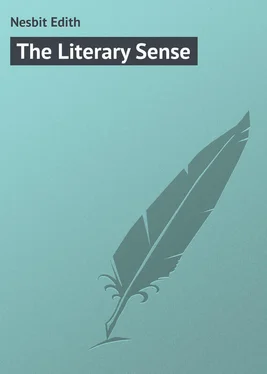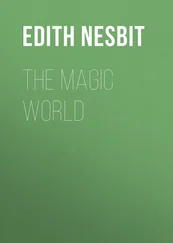Edith Nesbit - The Literary Sense
Здесь есть возможность читать онлайн «Edith Nesbit - The Literary Sense» — ознакомительный отрывок электронной книги совершенно бесплатно, а после прочтения отрывка купить полную версию. В некоторых случаях можно слушать аудио, скачать через торрент в формате fb2 и присутствует краткое содержание. Жанр: foreign_prose, на английском языке. Описание произведения, (предисловие) а так же отзывы посетителей доступны на портале библиотеки ЛибКат.
- Название:The Literary Sense
- Автор:
- Жанр:
- Год:неизвестен
- ISBN:нет данных
- Рейтинг книги:4 / 5. Голосов: 1
-
Избранное:Добавить в избранное
- Отзывы:
-
Ваша оценка:
- 80
- 1
- 2
- 3
- 4
- 5
The Literary Sense: краткое содержание, описание и аннотация
Предлагаем к чтению аннотацию, описание, краткое содержание или предисловие (зависит от того, что написал сам автор книги «The Literary Sense»). Если вы не нашли необходимую информацию о книге — напишите в комментариях, мы постараемся отыскать её.
The Literary Sense — читать онлайн ознакомительный отрывок
Ниже представлен текст книги, разбитый по страницам. Система сохранения места последней прочитанной страницы, позволяет с удобством читать онлайн бесплатно книгу «The Literary Sense», без необходимости каждый раз заново искать на чём Вы остановились. Поставьте закладку, и сможете в любой момент перейти на страницу, на которой закончили чтение.
Интервал:
Закладка:
"I don't wonder you were afraid to tell me," she began. "You don't love me – you've never loved me – I was an idiot to believe you did."
"You know I do," he said; "it was hateful of me – but I couldn't help it."
Those four true words wounded her more than all the rest.
"Couldn't help it? Then how can I ever trust you? Even if we were married I could never be sure you weren't kissing some horrid girl or other. No – it's no use – I can never, never forgive you – and it's all over. And I believed in you so, and trusted you – I thought you were the soul of honour."
He could not say, "And so I am, on the whole," which was what he thought. Her tears were falling hot and fast between face and veil, for she had talked till she was very sorry indeed for herself.
"Forgive me, dear," he said.
Then she rose to the occasion. "Never," she said, her eyes flashing through her tears. "You've deceived me once – you'd do it again! No, it's all over – you've broken my heart and destroyed my faith in human nature. I hope I shall never see you again. Some day you'll understand what you've done, and be sorry!"
"Do you think I'm not sorry now?"
She wished that they were at home, and not in this horrible tea-shop, under the curious eyes of the waitresses. At home she could at least have buried her face in the sofa cushions and resisted all his pleading, – at last, perhaps, letting him take one cold passive hand and shower frantic kisses upon it.
He would come to-morrow, however, and then – At present the thing to compass was a dignified parting.
"Good-bye," she said; "I'm going home. And it's good-bye for ever. No – it's only painful for both of us. There's no more to be said; you've betrayed me. I didn't think a decent man could do such things." She was pulling on her gloves. "Go home and gloat over it all! And that poor girl – you've broken her heart too." This really was a master stroke of nobility.
He stood up suddenly. "Do you mean it?" he said, and his tone should have warned her. "Are you really going to throw me over for a thing like this?"
The anger in his eyes frightened her, and the misery of his face wrung her heart; but how could she say —
"No, of course I'm not! I'm only talking as I know good girls ought to talk"?
So she said —
"Yes. Good-bye!"
He stood up suddenly. "Then good-bye," he said, "and may God forgive you as I do!" And he strode down between the marble tables and out by the swing-door. It was a very good exit. At the corner he remembered that he had gone away without paying for the tea, and his natural impulse was to go back and remedy that error. And if he had they would certainly have made it up. But how could he go back to say, "We are parting for ever; but still, I must insist on the sad pleasure of paying for our tea – for the last time"? He checked the silly impulse. What was tea, and the price of tea, in this cataclysmic overthrowing of the Universe? So she waited for him in vain, and at last paid for the tea herself, and went home to wait there – and there, too, in vain, for he never came back to her. He loved her with all his heart, and he, also, had what she had never suspected in him – the literary sense. Therefore he, never dreaming that the literary sense had inspired her too, perceived that to the jilted lover two courses only are possible – suicide or "the front." So he enlisted, and went to South Africa, and he never came home covered with medals and glory, which was rather his idea, to the few simple words of explanation that would have made all straight, and repaid her and him for all the past. Because Destiny is almost without the literary sense, and Destiny carelessly decreed that he should die of enteric in a wretched hut, without so much as hearing a gun fired. Literary to the soul, she has taken no other lover, but mourns him faithfully to this hour. Yet perhaps, after all, that is not because of the literary sense. It may be because she loved him. I think I have not mentioned before that she did love him.
ROUNDING OFF A SCENE
A SOFT rain was falling. Umbrellas swayed and gleamed in the light of the street lamps. The brightness of the shop windows reflected itself in the muddy mirror of the wet pavements. A miserable night, a dreary night, a night to tempt the wretched to the glimmering Embankment, and thence to the river, hardly wetter or cleaner than the gutters of the London streets. Yet the sight of these same streets was like wine in the veins to a man who drove through them in a hansom piled with Gladstone bags and P. and O. trunks. He leaned over the apron of the hansom and looked eagerly, longingly, lovingly, at every sordid detail: the crowd on the pavement, its haste as intelligible to him as the rush of ants when their hill is disturbed by the spade; the glory and glow of corner public-houses; the shifting dance of the gleaming wet umbrellas. It was England, it was London, it was home – and his heart swelled till he felt it in his throat. After ten years – the dream realised, the longing appeased. London – and all was said.
His cab, delayed by a red newspaper cart, jammed in altercative contact with a dray full of brown barrels, paused in Cannon Street. The eyes that drank in the scene perceived a familiar face watching on the edge of the pavement for a chance to cross the road under the horses' heads – the face of one who ten years ago had been the slightest of acquaintances. Now time and home-longing juggled with memory till the face seemed that of a friend. To meet a friend – this did, indeed, round off the scene of the home-coming. The man in the cab threw back the doors and leapt out. He crossed under the very nose-bag of a stationed dray horse. He wrung the friend – last seen as an acquaintance – by the hand. The friend caught fire at the contact. Any passer-by, who should have been spared a moment for observation by the cares of umbrella and top-hat, had surely said, "Damon and Pythias!" and gone onward smiling in sympathy with friends long severed and at last reunited.
The little scene ended in a cordial invitation from the impromptu Damon, on the pavement, to Pythias, of the cab, to a little dance that evening at Damon's house, out Sydenham way. Pythias accepted with enthusiasm, though at his normal temperature, he was no longer a dancing man. The address was noted, hands clasped again with strenuous cordiality, and Pythias regained his hansom. It set him down at the hotel from which ten years before he had taken cab to Fenchurch Street Station. The menu of his dinner had been running in his head, like a poem, all through the wet shining streets. He ordered, therefore, without hesitation —
Ox-tail Soup.
Boiled Cod and Oyster Sauce.
Roast Beef and Horse-radish.
Boiled Potatoes. Brussels Sprouts.
Cabinet Pudding.
Stilton. Celery.
The cabinet pudding was the waiter's suggestion. Anything that called itself "pudding" would have pleased as well. He dressed hurriedly, and when the soup and the wine card appeared together before him he ordered draught bitter – a pint.
"And bring it in a tankard," said he.
The drive to Sydenham was, if possible, a happier dream than had been the drive from Fenchurch Street to Charing Cross. There were many definite reasons why he should have been glad to be in England, glad to leave behind him the hard work of his Indian life, and to settle down as a landed proprietor. But he did not think definite thoughts. The whole soul and body of the man were filled and suffused by the glow that transfuses the blood of the schoolboy at the end of the term.
The lights, the striped awning, the red carpet of the Sydenham house thrilled and charmed him. Park Lane could have lent them no further grace – Belgrave Square no more subtle witchery. This was England, England, England!
Читать дальшеИнтервал:
Закладка:
Похожие книги на «The Literary Sense»
Представляем Вашему вниманию похожие книги на «The Literary Sense» списком для выбора. Мы отобрали схожую по названию и смыслу литературу в надежде предоставить читателям больше вариантов отыскать новые, интересные, ещё непрочитанные произведения.
Обсуждение, отзывы о книге «The Literary Sense» и просто собственные мнения читателей. Оставьте ваши комментарии, напишите, что Вы думаете о произведении, его смысле или главных героях. Укажите что конкретно понравилось, а что нет, и почему Вы так считаете.












